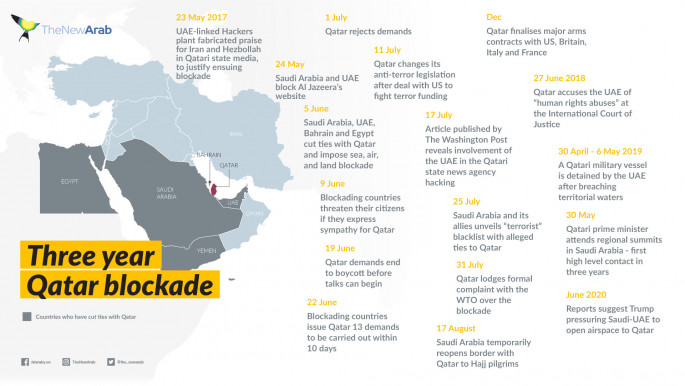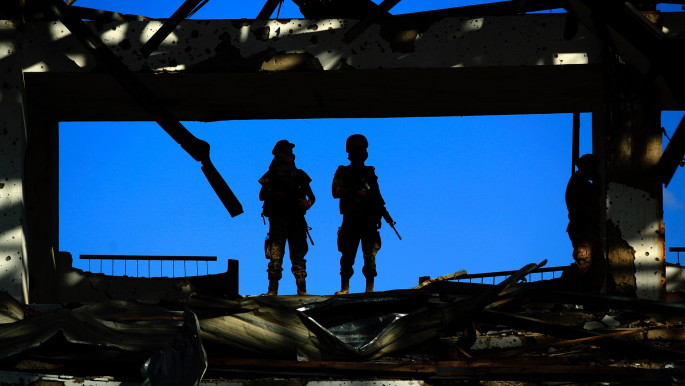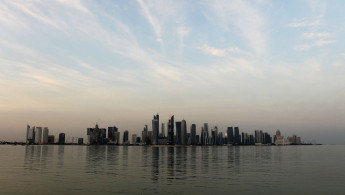Taking stock of the anti-Qatar blockade three years later
Qatar faced accusations of supporting "terrorism", and the quartet gave Doha a thirteen-point ultimatum to carry out within ten days, including shuttering media outlets including Al Jazeera, ending ties with Iran, downscaling military cooperation with Turkey, and severing ties to "terrorist groups".
Qatar rejected the accusations and demands, saying there was "no legitimate justification" for severing relations.
On 24 May, 2017, a story appeared on Qatar's state news agency reporting fabricated remarks in which the emir supposedly praised the Muslim Brotherhood, Hamas, Hezbollah and Iran.
Shortly afterwards the article was removed, with Doha criticising the UAE for hacking the news agency and posting false quotes. The Washington Post, citing US intelligence officials, corroborated the hack, reporting that the UAE had orchestrated the planted report.
The incident illustrated how the blockading countries sought to vilify Doha within Western circles, particularly Washington. The Qatar-based Al Jazeera news network also fell victim to a series of cyberattacks, days after the crisis erupted.
 |
On 5 June, 2017, Saudi Arabia, the UAE, Egypt and Bahrain severed diplomatic and economic ties with Qatar, imposing a sea, land and air blockade |  |
Moreover, on 6 June, 2017, Donald Trump effectively echoed Saudi Arabia's narratives and justified their stance, tweeting "During my recent trip to the Middle East I stated that there can no longer be funding of Radical Ideology. Leaders pointed to Qatar – look!"
Saudi Arabia and the UAE had even reportedly sought to invade Qatar and topple the ruling Al Thani family. However, former US Secretary of State Rex Tillerson reportedly intervened and thwarted this move, prompting Riyadh and Abu Dhabi to lobby Washington hard for Tillerson's dismissal, and then continue their blockade.
A 'blessing in disguise'?
Despite a past dependency on food and other essential imports from its Gulf partners, Qatar managed to quickly alleviate these challenges and built up alternative trade routes, helping its economy to survive and even prosper.
 |
|
| Timeline of the Crisis Click to enlarge |
A Chatham House report last November showed Qatar has increased imports from the US and EU, and even moved to develop its own food industry, becoming more self-sufficient in dairy, crop irrigation and vegetable production.
Qatar also cultivated more trade with Turkey and Iran and elsewhere, like the Horn of Africa, after commencing construction on Somalia's Hobyo port last August, with a view of expanding relations elsewhere in the continent.
In February, the International Monetary Fund predicted Qatar's growth would slightly outpace that of the UAE and Saudi Arabia in 2020.
Furthermore, assistant professor at King's College London Andreas Krieg argued that the blockade prepared Qatar well for the coronavirus pandemic as it "has learned how to weather the storm, diversify its supply chains, localise supplies where necessary and build up strategic reserves."
From Qatar's perspective, Foreign Ministry Spokesperson Lolwah al-Khater describes the blockade as a "blessing in disguise," as attempts to isolate Qatar have ironically led to the country flourishing.
Dashed reunification hopes
Meanwhile the Gulf crisis triggered greater regionwide rifts, while driving Qatar and Turkey closer together. The UAE and Saudi Arabia sought to punish Somalia, perceiving its closeness with Doha and Ankara, while also pressing other African countries to support their cause. Both countries and Egypt attempted to steer post-revolution Sudan from April 2019 towards their anti-Qatar bloc.
 |
Despite speculation that the coronavirus pandemic could ease Gulf tensions, disinformation and fake news campaigns have ramped up, promoted by state-sponsored bots and trolls |  |
Rivalries and concerns for regional influence largely drive tensions. The UAE suggested it would be willing to engage diplomatically with Qatar if it shared hosting the 2022 Qatar FIFA World Cup, indicating that Abu Dhabi's disdain towards Doha's success drives its antagonistic policies.
These ongoing desires to force Qatar's submission to Saudi Arabia and the UAE's regional hegemony still prevent reunification.
After Riyadh showed more receptivity towards Doha, Qatar's invitation to join the GCC Summit in Saudi Arabia last December suggested a possible thawing of tensions. Saudi Arabia reportedly felt more vulnerable, after the attacks on its Aramco oil facilities last September.
 |
|
| Read more: Online disinformation campaign seeks to blame Qatar for coronavirus crisis |
Yet the UAE's tensions with Qatar persisted, while Abu Dhabi sought to expand its own foreign policy influence, independent from its traditional ally Saudi Arabia. The UAE would likely hold Saudi Arabia back from accepting and tolerating Doha, while it still develops as a regional powerhouse.
The UAE has also improved ties with Iran amid the coronavirus crisis, despite criticising Qatar for doing so, indicating its own defiance of the stated justifications of the blockade on Doha. Such independent agendas also show a drift from the GCC's founding principles in 1981, largely aimed at containing revolutionary Iran's influence.
While Kuwait is more impartial and has tried to mediate the crisis, its sole efforts are limited. Even Oman has faced Saudi and Emirati pressure over its more neutral stance on Yemen's war, revealing a wider fracturing within the GCC and its failures to create unity.
 |
Despite a past dependency on food and other essential imports from its Gulf partners, Qatar managed to quickly alleviate these challenges and built up alternatives trade routes, helping its economy to survive and even prosper |  |
Qatar's foreign minister Sheikh Mohammed bin Abdulrahman Al Thani said that by late January, talks to resolve the crisis were unsuccessful. "We were not perpetrators and are open to any offer to resolve this problem."
Fake news amid the pandemic
Qatar joined a virtual GCC summit on 23 March, where ministers "stressed the necessity to coordinate precautionary measures among the GCC states on all sectors to support economic recovery, and to unify measures taken to combat the epidemic."
 |
|
| Read more: Saudi Arabia's faltering divide and rule strategy in Yemen |
Despite speculation that the coronavirus pandemic could ease Gulf tensions, disinformation and fake news campaigns have ramped up, promoted by state-sponsored bots and trolls.
One Saudi journalist tweeted Qatar's supposed knowledge of the coronavirus since 2015, while hundreds of state-aligned Saudi bots blamed Doha for spreading the virus.
Then in May, a tweet of a doctored video from a window with gunfire emerged, depicting an alleged coup in Qatar. It spread quickly with almost 300,000 views, while Saudi and Emirati media reported it as legitimate footage. Meanwhile rumours circulated in late May that Qatar planned to quit the GCC, claims Doha denied as "baseless."
US and Gulf officials report Trump is currently seeking a new initiative to resolve the Gulf crisis. However, some analysts argue that Trump's unconditional support of hardliner Saudi Crown Prince Mohammed bin Salman, and also Abu Dhabi's Crown Prince Mohammed bin Zayed, is what enabled the GCC rift to emerge in the first place.



